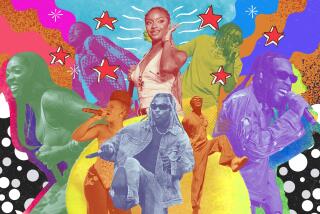Black Umfolosi Presents Song, Dance of Zimbabwe
- Share via
When the eight members of Black Umfolosi walked on stage at Caltech’s Beckman Auditorium on Friday, they seemed unassuming enough. Working on a bare stage, with no instrumental accompaniment, the vocal and dance ensemble from Bulawayo, Zimbabwe, immediately dug into a program of Ndebele/Zulu songs filled with surging rhythms and warm-textured harmonies. But it was only the beginning of an entertaining look into the culture of the Ndebele-speaking region of Zimbabwe.
Interest can wane quickly with a cappella groups, especially when they sing in an unfamiliar language. No such problem with Black Umfolosi. The singers interspersed their Ndebele songs with occasional English lyrics, and their repertoire--which included love songs, work songs, hymns of celebration and numbers that dealt with conservation and racial harmony--was accompanied by movements of hands and feet illustrating the thrust of the lyrics.
This process was expanded in the program’s second half, when the singers appeared dressed in traditional Zulu costumes, performing as well on drums and rattles. The pieces--”Ambhiza Dance,” “Umchonqoyo” and “Indlamu”-- were, successively, a thanksgiving rain dance, a war dance and a dance to salute a king. The actions and movements were pantomime-like, visually interacting with the music to call down the rain, confirm their warrior bravura and demonstrate dynamic vigor.
The performance ended with the “Gumboot Dance”--a fascinating work originating in the mines of South Africa, incorporating an array of complex percussive sounds created by the slapping and stomping of rubber boots, accompanied by a song complaining of low wages and difficult working conditions. It was, perhaps ironically, the most-applauded song of the evening, with members of the audience joining in the boot-slapping.
More to Read
The biggest entertainment stories
Get our big stories about Hollywood, film, television, music, arts, culture and more right in your inbox as soon as they publish.
You may occasionally receive promotional content from the Los Angeles Times.










